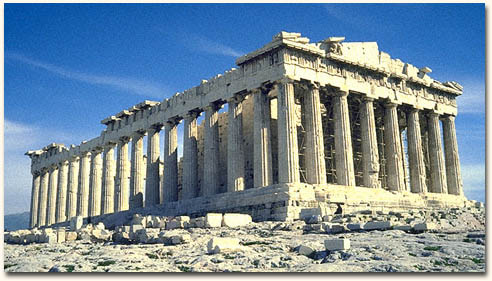
by
Will Durant

To the
philosopher, all things are friendly and sacred, all
events profitable, all days holy, all men divine.
-- Emerson
If Greek civilization
seems more akin and "modem" to us now than
that of any century before Voltaire, it is because
the Hellene loved reason as much as form, and boldly
sought to explain all nature in nature's terms.
The liberation of
science from theology and the independent development
of scientific research were parts of the heady
adventure of the Greek mind. Greek mathematicians
laid the foundations of trigonometry and calculus;
they began and completed the study of conic sections,
and they brought three-dimensional geometry to such
relative perfection that it remained as they left it
until Descartes and Pascal.
Democritus illuminated
the whole area of physics and chemistry with his
atomic theory. In a mere aside and holiday from
abstract studies, Archimedes produced enough new
mechanisms to place his name with the highest in the
records of invention. Aristarchus anticipated and
perhaps inspired Copernicus; and Hipparchus, through
Claudius Ptolemy, constructed a system of astronomy
which is one of the landmarks in cultural history.
Eratosthenes measured
the earth and mapped it. Anaxagoras and Empedoeles
drew the outlines of a theory of evolution. Aristotle
and Theophrastus classified the animal and plant
kingdoms and almost created the sciences of
meteorology, zoology, embryology and botany.
Hippocrates freed medicine from mysticism and
philosophical theory, and ennobled it with an ethical
code; Herophilus and Erasistratus raised anatomy and
physiology to a point which -- except in Galen --
Europe would not reach again till the Renaissance.
In the work of these
men we breathe the quiet air of reason, always
uncertain and unsafe, but cleansed of passion and
myth. Perhaps, if we had its masterpieces entire, we
should rate Greek science as the most signal
intellectual achievement of mankind.
But the lover of
philosophy will only reluctantly yield to science and
art the supreme places in our Grecian heritage. Greek
science itself was a child of Greek philosophy -- of
that reckless challenge to legend, that youthful love
of inquiry, which for centuries united science and
philosophy in one adventurous quest. Never had men
examined nature so critically and yet so
affectionately; the Greeks did no dishonor to the
world in thinking that it was a cosmos of order and
therefore amenable to understanding. They invented
logic for the same reason that they made perfect
statuary; harmony, unity, proportion, form, in their
view, provided both the art of logic and the logic of
art.
Curious of every fact
and every theory, they not only established
philosophy as a distinct enterprise of the European
mind, but they conceived nearly every system and
every hypothesis and left little to be said on any
major problem of life. Realism and nominalism,
idealism and materialism, monotheism, pantheism, and
atheism, feminism and communism, the Kantian critique
and the Schopenhaurian despair, the primitivism of
Rousseau and the immoralism of Nietzsche, the
synthesis of Spencer and the psychoanalysis of Freud
-- all the dreams and wisdom of philosophy are here
in the age and land of its birth. And in Greece men
not only talked of philosophy, they lived it; the
sage, rather than the warrior or the saint, was the
pinnacle and ideal of Greek life.
Through all the
centuries from Thales, that exhilarating
philosophical bequest has come down to us, inspiring
Roman emperors, Christian Fathers, Scholastic
theologians, Renaissance heretics, Cambridge
Platonists, the rebels of the Enlightenment and the
devotees of philosophy today. At this moment,
thousands of eager spirits are reading Plato --
perhaps in every country on the earth.
Civilization does not
die, it migrates; it changes its habitat and its
dress, but it lives on. The decay of one
civilization, as of one individual, makes room for
the growth of another; life sheds the old skin and
surprises death with fresh youth. Greek civilization
is alive; it moves in every breath of mind that we
breathe; so much of it remains that none of us in one
lifetime could absorb it all.
We know its defects --
its insane and pitiless wars, its stagnant slavery,
its subjection of woman, its lack of moral restraint,
its corrupt individualism, its tragic failure to
unite liberty with order and peace. But those who
cherish freedom, reason and beauty will not linger
over these blemishes. They will hear behind the
turmoil of political history the voices of Solon and
Socrates, of Plato and Euripides, of Phidias and
Praxiteles, of Epicurus and Archimedes; they will be
grateful for the existence of such men and will seek
their company across alien centuries.
They will think of
Greece as the bright morning of that Western
civilization which, with all its kindred faults, is
our nourishment and our life.
.